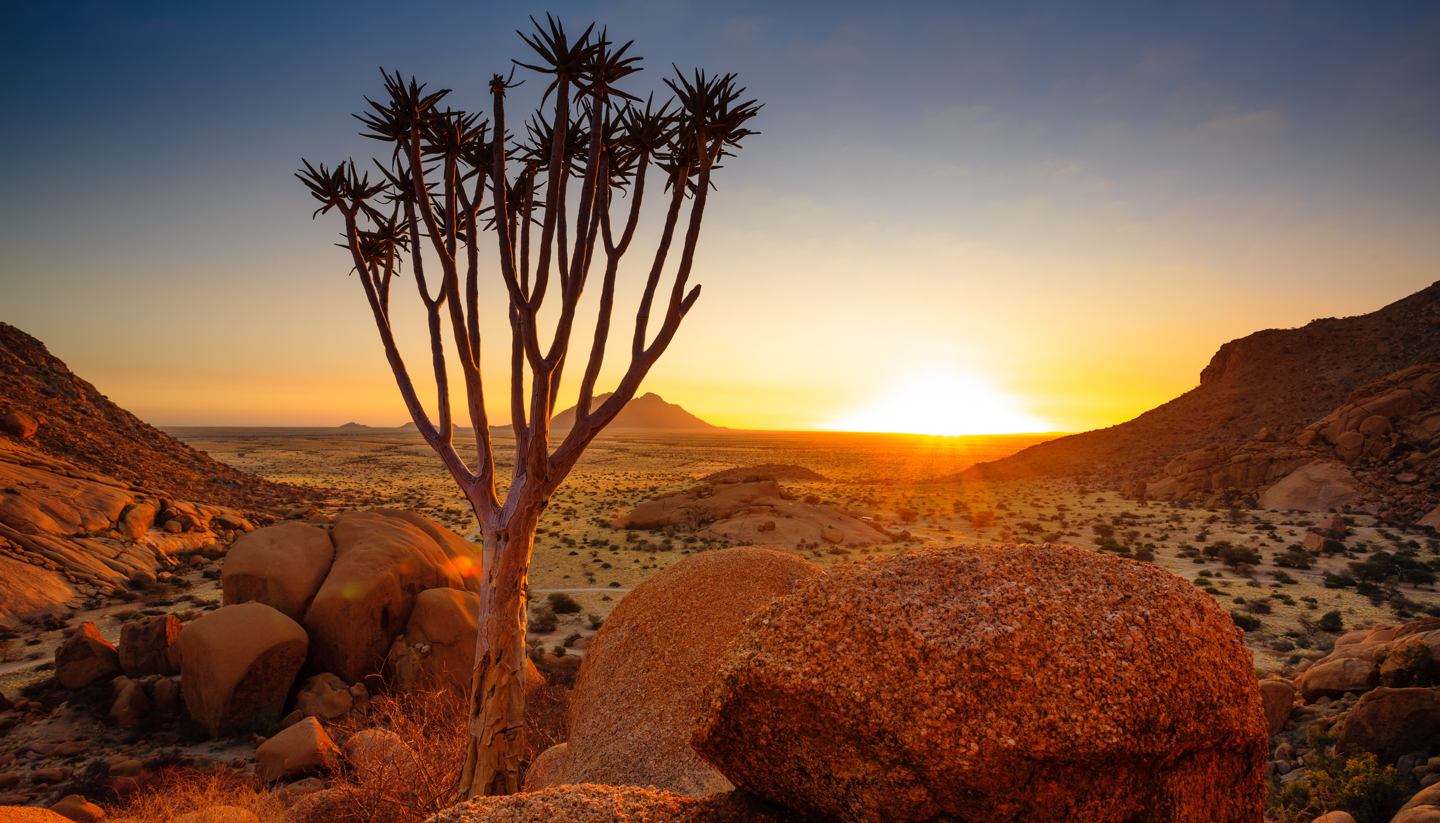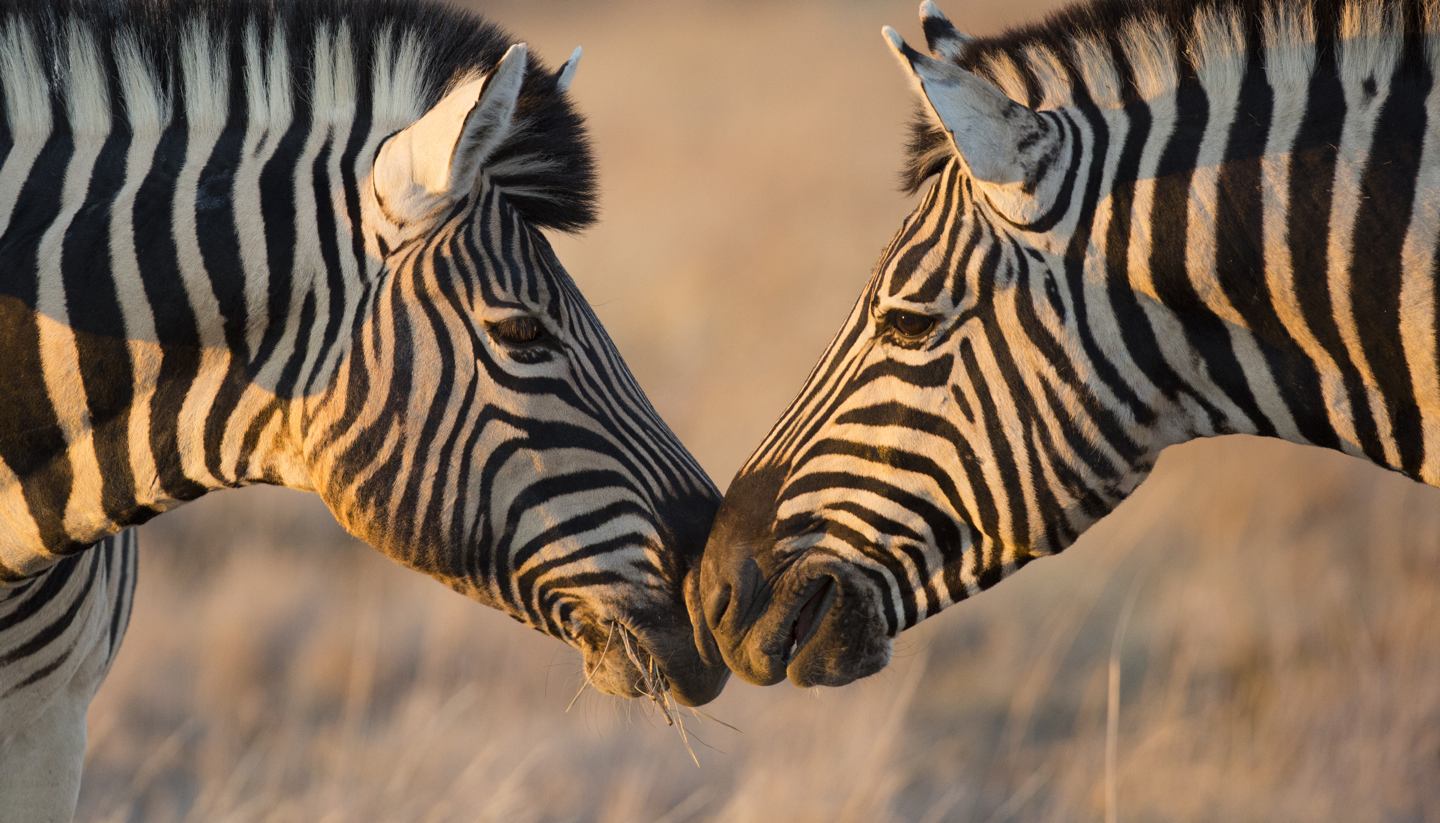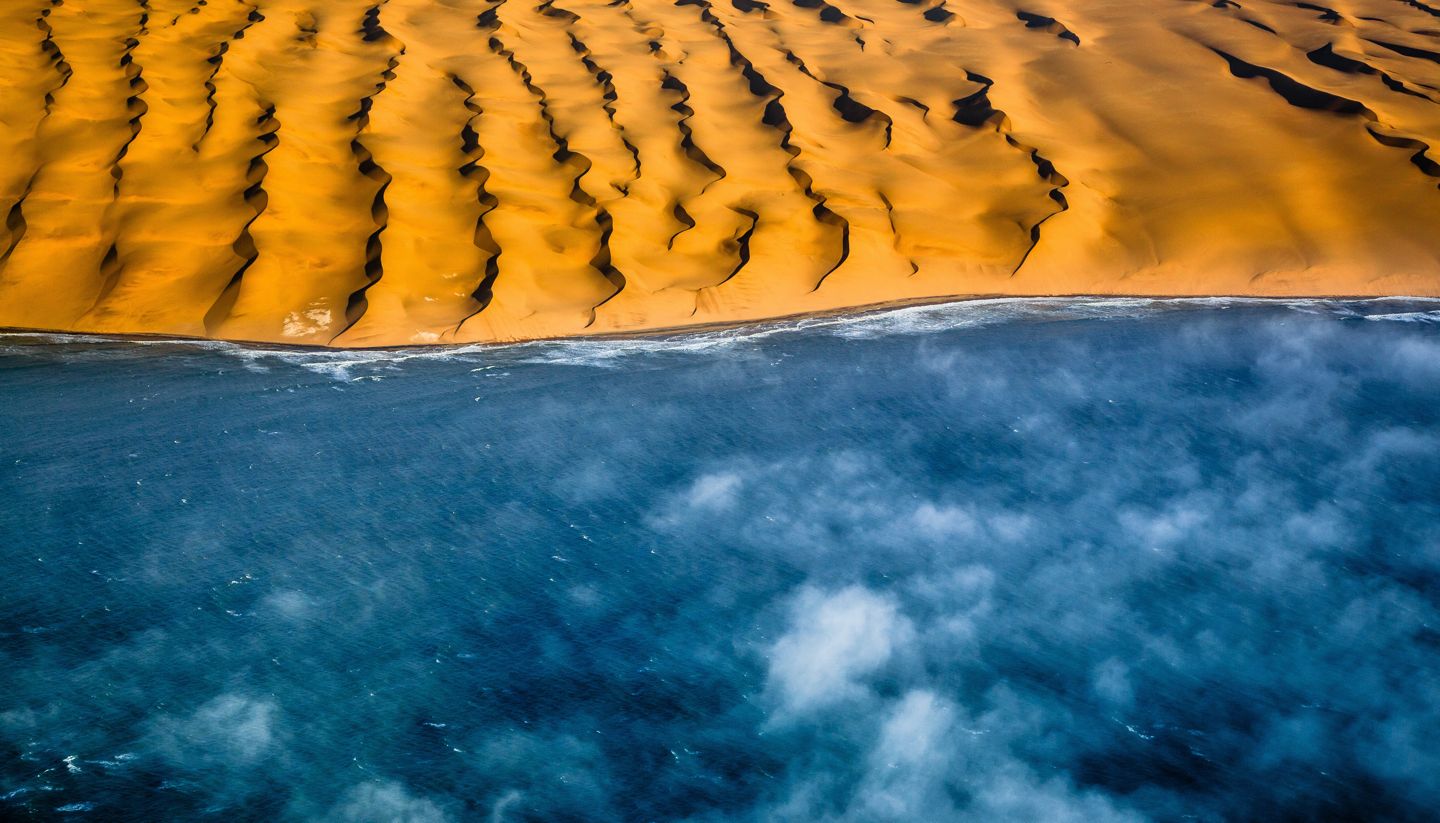Namibia travel guide
About Namibia
From the seemingly endless sand dunes of the Namib Desert to the tropical wetlands of the Caprivi Strip, Namibia is a country of epic landscapes, bountiful wildlife and few people. Its greatest assets are the rugged Namib and Kalahari deserts, which support a surprising diversity of fauna including rare black rhinos, cheetahs, and vast groups of gemsbok, zebra and ostrich.
Parts of Namibia can be harsh and unforgiving, and nowhere is this more evident than along the Skeleton Coast. Shrouded in thick fog, lashed by Atlantic waves, occupied by shifting dunes, and littered with rusting carcasses of ships ran aground on its shores, this area certainly makes travellers feel like they are far removed from civilisation.
Away from the dreamscape of sand and rock, the wildlife-rich Etosha National Park is another must-see. During the dry season, herds of wildebeest and dazzles of zebras congregate at waterholes scattered around the park, while predators wait patiently for a chance to pounce – the dramatic scenes of pursuit offer unforgettable experiences.
Other worth-noting national parks are Ai-Ais in the south and Khaudum in the northeast. The former is home to the Fish River Canyon, Africa's largest canyon, while the latter welcomes more elephants than people to the park.
Namibia's capital is Windhoek, a vibrant, modern city perching on the Khomas Highland in central Namibia. Its colonial architecture, thriving culinary scene and excellent beer make it a pleasant place to while away a few days.
On the whole, Namibia is delightfully wild and unspoilt, offering plenty of off-the-beaten-track destinations for travellers to experience the ultimate safari adventure, capture stunning landscape shots, and above all, find quiet and solitude.
Key facts
824,292 sq km (318,261 sq miles).
2,494,530 (2021).
3 per sq km.
Windhoek.
Republic.
President Hage Geingob since 2015.
Prime Minister Saara Kuugongelwa-Amadhila since 2015.
Travel Advice
The Foreign, Commonwealth & Development Office (FCDO) provides advice about risks of travel to help British nationals make informed decisions. Find out more about FCDO travel advice.
Before you travel
No travel can be guaranteed safe. Read all the advice in this guide and any specific travel advice that applies to you:
Follow and contact FCDO travel on Twitter, Facebook and Instagram. You can also sign up to get email notifications when this advice is updated.
Travel insurance
If you choose to travel, research your destinations and get appropriate travel insurance. Insurance should cover your itinerary, planned activities and expenses in an emergency.
This advice reflects the UK government’s understanding of current rules for people travelling on a full ‘British citizen’ passport from the UK, for the most common types of travel.
The authorities in Namibia set and enforce entry rules. If you’re not sure how these requirements apply to you, contact the Namibian High Commission in the UK.
COVID-19 rules
There are no COVID-19 testing or vaccination requirements for travellers entering Namibia.
Passport validity requirements
To enter Namibia, your passport must have an ‘expiry date’ at least 6 months after the date you arrive. It must also have at least one blank page. If you’re travelling to South Africa, you will need 3 blank pages.
Check with your travel provider that your passport and other travel documents meet requirements. Renew your passport if you need to.
You will be denied entry if you do not have a valid travel document or try to use a passport that has been reported lost or stolen.
Visa requirements
You can visit Namibia for up to 90 days without a visa. If you plan to work or volunteer, or if you want to stay longer, you must get a visa.
Applying for a visa
Apply through the Namibian High Commission in the UK.
Make sure you get your passport stamped.
Make sure the date on your entry stamp and the amount of time you have been given to stay is correct. Immigration officials will check these details when you leave Namibia.
The Namibian authorities could detain, arrest or fine you if you overstay or have an incorrect or missing entry stamp in your passport.
Travelling with children aged 17 and under
If you’re a parent travelling with children aged 17 and under, you must carry their:
- valid passport
- full birth certificate with both parents’ details (original or certified copy)
Namibian immigration officials will not accept an abridged (short) birth certificate. If your child was born in the UK, you can order a full unabridged birth certificate online.
If you’re a legal guardian and your name is not on the birth certificate, you will need to have documentation to prove it.
If you’re not a parent or legal guardian of children you’re travelling with, you must have an affidavit from their parents or guardians giving consent.
If a child is travelling with one parent or legal guardian, the other parent or legal guardian should give consent for travel in an affidavit.
Unaccompanied children must carry:
- a valid passport
- proof of consent from a parent or legal guardian in an affidavit
- a letter from their host giving the address where they’ll be staying
Contact the Namibian High Commission in the UK for more information.
Travelling with children through a South African airport
If you’re travelling with children through a South African airport, see South Africa travel advice for information about the documents you must carry.
Vaccination requirements
At least 8 weeks before your trip, check the vaccinations and certificates you need in TravelHealthPro’s Namibia guide.
Depending on your circumstances, this may include a yellow fever certificate.
Customs rules
There are strict rules about goods you can take into or out of Namibia. You must declare anything that may be prohibited or subject to tax or duty.
Terrorism
There is a high threat of terrorist attack globally affecting UK interests and British nationals, including from groups and individuals who view the UK and British nationals as targets. Stay aware of your surroundings at all times.
UK Counter Terrorism Policing has information and advice on staying safe abroad and what to do in the event of a terrorist attack. Find out how to reduce your risk from terrorism while abroad.
Terrorism in Namibia
Although there’s no recent history of terrorism in Namibia, attacks cannot be ruled out.
Crime
Protecting yourself and your belongings
Muggers often target tourists in Windhoek. Attacks may be violent and can take place at any time of day and in busy city-centre locations. To reduce your personal risk:
- be aware of your surroundings, especially after dark
- keep your valuables and cash out of sight or use a hotel safe
- do not change large sums of money in busy public areas
Vehicle crime
Gangs sometimes try to enter vehicles at busy intersections in Windhoek. Theft from vehicles, particularly at service stations, is common. To reduce the risks:
- do not leave your vehicle unattended at fuel stops
- keep car doors locked and windows shut, especially in heavy traffic
- keep valuables off the seats and out of sight
To reduce the risk of robberies from taxis:
- do not hail taxis from the street, particularly in Windhoek
- ask your hotel, guest house or tour operator to recommend a reputable taxi company
- do not enter townships at night, unless you are with someone with local knowledge
Credit card skimming
There have been cases of credit card skimming at some hotels and lodges. Always keep your card in sight when paying and check your statement.
Laws and cultural differences
Personal ID
Always carry UK photo ID. You may need to show ID at police checkpoints in Windhoek and other major towns and cities. Keep copies of the photo page of your passport and important documents separately in a safe place.
LGBT+ travellers
Same-sex relationships are not illegal in Namibia. Certain same-sex sexual acts are illegal, but generally not prosecuted. There are no laws against discrimination on the grounds of sexual orientation. Conservative attitudes towards LGBT+ individuals remain, especially in rural regions. Showing affection in public may result in unwanted attention.
Read more advice for LGBT+ travellers.
Illegal drugs and prison sentences
Penalties for using or smuggling illegal drugs can be severe. Penalties include large fines and imprisonment.
Wildlife, animal products and souvenirs
It’s illegal to buy, sell, kill or capture any protected wild animal or trade its parts without a licence. You will be prosecuted and could get a fine or prison sentence for buying or trafficking these goods, including ivory and rhino horn.
Using cameras in secure areas
Police have detained people for taking pictures of the President’s official residence. Check before taking photographs of government buildings or in secure areas.
Outdoor activities and adventure tourism
Make sure your travel insurance covers you for any adventure activities you plan to do, like quad biking, dune boarding or hot air ballooning.
Transport risks
Road travel
If you are planning to drive in Namibia, see information on driving abroad.
You’ll need to have both the 1949 version of the international driving permit (IDP) and your UK photocard driving licence with you in the car.
Take out comprehensive insurance as accidents are common on gravel and dirt roads. If you’re planning to hire a car, check what insurance cover is provided. Most policies will not cover accidents that do not involve other vehicles or animals.
Driving standards
During the rainy season from January to April, many gravel roads deteriorate. You should:
- not go faster than 80 km/h
- carry 2 spare tyres for punctures
- carry plenty of water
- check the road conditions before setting off
- avoid driving at night outside towns, as wildlife and livestock are serious hazards
Before you travel check that:
- your destination can provide the healthcare you may need
- you have appropriate travel insurance for local treatment or unexpected medical evacuation
This is particularly important if you have a health condition or are pregnant.
Emergency medical number
Call 211111 (in Windhoek) or 10111 (everywhere else) and ask for an ambulance.
Contact your insurance company promptly if you’re referred to a medical facility for treatment.
Vaccinations and health risks
At least 8 weeks before your trip check:
- the latest information on vaccination recommendations and health risks in TravelHealthPro’s Namibia guide
- where to get vaccines and whether you have to pay on the NHS travel vaccinations page
Altitude sickness is a risk in parts of Namibia. Read more about altitude sickness on TravelHealthPro.
Namibia’s hot and dry climate can cause skin problems and dehydration. Make sure you carry a good supply of drinkable water.
Namibia has one of the highest prevalence rates of HIV in the world. In 2021 the UNAIDS Report on the Global AIDS Epidemic estimated that around 210,000 adults aged 15 or over were living with HIV. This was around 11.8% of the adult population, compared to around 0.2% of adults in the UK. Take normal precautions to avoid exposure to HIV/AIDS.
Medication
The legal status and regulation of some medicines prescribed or bought in the UK can be different in other countries.
Read best practice when travelling with medicines on TravelHealthPro.
The NHS has information on whether you can take your medicine abroad.
Healthcare facilities in Namibia
There are good medical facilities in Windhoek. Private hospitals may insist on payment before starting treatment even if you have comprehensive travel insurance. They may ask you to pay and reclaim from your insurer later. Some travel insurance policies are not recognised by some Namibian hospitals. Check if your product is accepted in Namibia before you travel and get alternative coverage, if needed.
FCDO has a list of medical providers in Namibia where some staff speak English.
Travel and mental health
Read FCDO guidance on travel and mental health. There is also mental health guidance on TravelHealthPro.
The Foreign, Commonwealth & Development Office (FCDO) cannot provide tailored advice for individual trips. Read this travel advice and carry out your own research before deciding whether to travel.
Emergency services in Namibia
Telephone: 10111, 999, 112 (ambulance, fire, police)
Contact your travel provider and insurer
Contact your travel provider and your insurer if you are involved in a serious incident or emergency abroad. They will tell you if they can help and what you need to do.
Refunds and changes to travel
For refunds or changes to travel, contact your travel provider. You may also be able to make a claim through insurance. However, insurers usually require you to talk to your travel provider first.
Find out more about changing or cancelling travel plans, including:
- where to get advice if you are in a dispute with a provider
- how to access previous versions of travel advice to support a claim
Support from FCDO
FCDO has guidance on staying safe and what to do if you need help or support abroad, including:
- finding English-speaking lawyers and funeral directors
- being arrested or imprisoned in Namibia
- getting help if you’re a victim of crime
- what to do if you’re in hospital
- if you’re affected by a crisis, such as a terrorist attack
Contacting FCDO
Follow and contact FCDO travel on Twitter, Facebook and Instagram. You can also sign up to get email notifications when this travel advice is updated.
You can also contact FCDO online.
Help abroad in an emergency
If you’re in Namibia and you need emergency help from the UK government, contact the British High Commission in Windhoek.
FCDO in London
You can call FCDO in London if you need urgent help because something has happened to a friend or relative abroad.
Telephone: 020 7008 5000 (24 hours)
Risk information for British companies
The Overseas Business Risk service offers information and advice for British companies operating overseas on how to manage political, economic, and business security-related risks.




